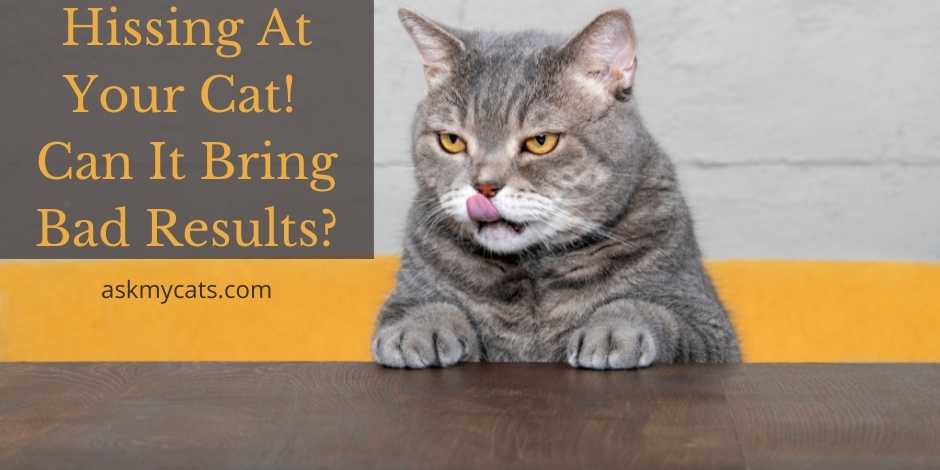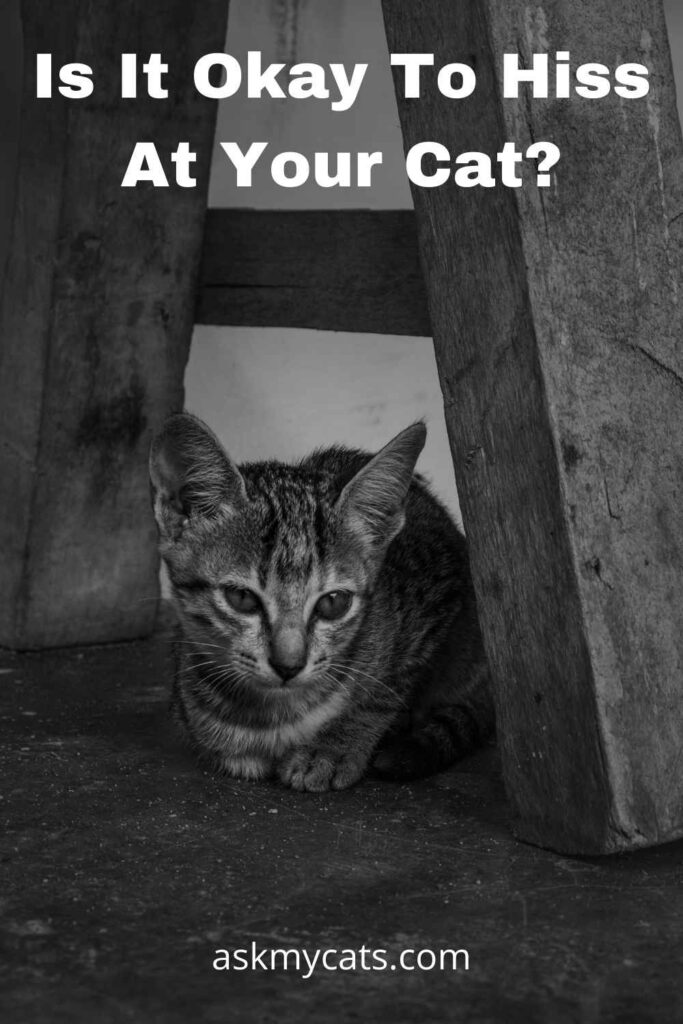Hissing at a cat is not a good idea because your cat may comprehend it as an aggressive behaviour, but it will not damage the cat physically.
Cats, on the other hand, hiss as a means of communication to indicate that they are in pain or are afraid. When they express their dissatisfaction, they may be feeling intimidated.
So now you know it’s not a smart idea to hiss back at your cat. Continue reading to find out how to determine whether your cat despises you, why your cat can hiss at you at random times, what to do if this happens, and much more.


Give Your Cat the Perfect Day
Get the Free Ebook!
Should I Hiss At My Cat?
You should not hiss at your cat as it will scare the little pet and will eventually scared of coming in front of you.

Movement, eye contact, tail and head bumps, and hissing are all ways cats communicate. When you mimic your cat’s language, they’ll notice when they’re doing anything wrong sooner. They’ll catch up on the language much faster if you start when they’re a kitten.
Making a lengthy sound imitates a hiss and can swiftly communicate to your cat that what they’re doing isn’t authorized. So your cat doesn’t become confused about the message you’re conveying, make the sound fast and at the exact moment the undesired behavior occurs.
The importance of repetition and follow-through cannot be overstated. If you make a sound and then touch your cat right away, they’ll be confused about the message you’re delivering, so make the sound and then withhold love for a few minutes.
Many cat gurus advocate soothing herbal items and plug-ins that provide a tranquil smell. The inherent soothing pheromones of cats are imitated by several herbal supplements.
Place these in the areas of your home where your cat has the greatest trouble. Set up a plugin in the living room, for example, if they become nervous and violent there.
The soothing aroma assures cat that everything is OK.
If another stray cat wanders outdoors, your cat may get frightened and violent. This cat’s fragrance, which your cat can detect even within your home, makes them feel as though their home is under danger.
Consider the possibility of a stranger circling your home and peering inside. You’d be agitated and hostile as well!
Find a strategy to discourage the guest for the sake of cat. For example, you may buy motion-activated timed sprinkler systems. The stray cat will be enticed to depart by the mild water spray, which will not harm them.
You may also take a spray bottle outdoors and produce the hissing sound to scare them away.
Finally, towering cat trees can help a cat that is too aggressive feel more in control.
Aggression can manifest itself when a cat feels helpless or vulnerable. They may be scared of other cats or dogs, as well as humans or children in the house.
They feel safer and have a better perspective of what’s going on around them since a cat tree is high off the ground. Climbing up and down the tree might also assist them in releasing pent-up energy! When visitors come to visit, a cat tree may even assist a shy cat come out of their shell and hang out.
Aggression in cats can be caused by a variety of causes. Remember that poor behaviour does not imply that your cat is bad. In fact, it’s typically a sign that your cat is anxious or overly energetic.
If you suspect a health problem, take them to the veterinarian. One of these treatments may help your cat become friendlier and more sociable once your cat has been given the all-clear.
In general, cats do not hiss when they are pleased, although they may hiss when they are playing. Savannahs and Bengals, for example, are considerably more likely to make hissing-like vocalisations when they are happy. Play hissing is acceptable if the cat is engaged in play and the hissing is not a harsh pain like hiss.
Is It Okay To Hiss At Your Cat?
It is not good to hiss at your cat because hissing imitates the sound of a snake about to attack. The sound is intended to scare the antagonizer into changing their conduct or fleeing.

Your cat’s hissing is a method of informing you that they have an issue that needs to be addressed. So it stands to reason that if you hiss at your cat, they’ll assume there’s a problem and/or become afraid and flee.
While hissing at them won’t damage them physically, it may make them feel insecure about their ability to convey their needs.
Hissing at random is not natural behaviour. If there are no other signs of discomfort and the random hissing continues, consult your veterinarian to discover if there is an internal problem.
When your cat is in discomfort, he or she will hiss loudly to draw your attention.
Other symptoms that your cat is in pain include:
- Increased sleep, decreased play, or the opposite and they are restless and up and down.
- Repetitive licking or, biting in the same spot
- Loss of appetite or ambulatory issues
- Shuffling when they walk
- Dilated pupils or a glazing over of the eyes
- Panting, if they are panting then they should go to the vet immediately.
- Change in personality.
- Messy fur, from their inability to groom themselves
What Does Hissing At Your Cat Do?
Hissing at your cat will make a negative impact of yourself in your kitty’s mind. He would be frightened about communicating with you further.
Hissing is a widely misunderstood habit in cats. Hissing is not an aggressive habit, and it is not usually displayed by an aggressive cat, contrary to common assumption.
A defensive gesture is hissing. It is nearly often displayed by a cat that is in pain.
In some manner, you’ve been victimised, antagonised, or threatened. Avoiding a physical confrontation by hissing is a common tactic.
When it comes to cat-to-cat dynamics and inter-cat violence, the cat who hisses on a regular basis is usually invariably the victim or the one who is chased or antagonised.
Hissing is a natural way for people to communicate their discomfort, anxiety, or tension. Threatened, insecure, and uneasy, a hissing kitten hisses.
The popular belief is that a hissing cat is “teasing” or “taunting” the other cat, dog, or person.
Hissing is just a display of feeling, such as “I’m upset,” “I’m threatened,” “I’m uneasy,” or “I’m afraid.”
Your cat is feeling vulnerable, frightened, or uneasy, whether it is hissing at veterinary personnel or a newcomer to the household.
If you try to “correct” or “penalise” your cat for hissing, you will simply aggravate an already unpleasant or frightening scenario, as well as your cat.
What Does My Cat Think When I Hiss At Her?
Your cat will think that they have done something wrong for which they are receiving the scold.

Cats are highly sensitive to human emotions, and it’s simple to upset your cat unintentionally while you’re angry. Apologizing to your cat is simple, but patience is required since, like people, your cat requires time to process their feelings.
You are setting yourself up for failure if you try to apologise too soon or if you run down and corner your cat to get them to accept your apologies.
Before you start the process of “making up,” make sure your cat comes to you. You can provide goodies and pets to your cat once he or she is ready to accept your apologies. Expect your cat to recover trust over time, so don’t hold your breath for immediate results.
When a cat is threatened, it will expel a blast of air from its lips, which produces a hissing sound. Other cat body language cues such as bared fangs, flattened ears, an arched back, and their hair standing on edge are frequently associated with this sound (also known as piloerection).
First and foremost, if your cat is hissing at you, give them some space. You don’t want to provoke an assault or violent behaviour from them. You should also constantly keep a careful watch on your cat’s body language; this way, you’ll be able to tell how they’re feeling before touching them, avoiding your cat hissing at you.
Additionally, if you have children, you should educate them how to pet and respect a cat, as youngsters have a hard time detecting signals that your cat is scared or concerned.
You should also make sure that your home has plenty of hiding places for your cat to go when they’re stressed. Igloos, cat trees, and high-up places are ideal since they provide them with some privacy.
Frequently Asked Questions
Why does my cat hiss when I walk by?
Avoiding a physical confrontation by hissing is a common tactic. When it comes to cat-to-cat dynamics and inter-cat violence, the cat who hisses on a regular basis is usually invariably the victim or the one who is chased or antagonized. Hissing is a natural way for people to communicate their discomfort, anxiety, or tension.
Do cats hiss to imitate snakes?
When cats hiss, they are, believe it or not, imitating snakes! Snakes are often considered to be among the most dangerous predators in the animal kingdom. Cats hiss in the same manner as snakes hiss to try to scare away whatever is attacking them.
Why does my cat hiss at everyone but me?
The most likely explanation is because they are protective of their home, but they might also be hostile to your visitors because they dislike change, or simply because they are predatory creatures with innate aggressiveness.
Final Words
It’s still better to hiss or wave a towel than to come in the way of two felines that are feuding. During violent episodes, they may be highly focused, and it’s difficult to drive yourself to the medical hospital while also isolating two furious cats in separate rooms.
Please shoot your queries in the comments section below!
References
- https://vcahospitals.com/know-your-pet/preventing-and-punishing-undesirable-behavior-in-cats
- https://pets.thenest.com/ok-discipline-cat-hissing-8922.html
- https://www.greatpetcare.com/en-in/cat-behavior-en-in/cat-hissing-everything-you-need-to-know/
- https://www.purina.co.uk/articles/cats/behaviour/understanding-cats/why-do-cats-hiss
